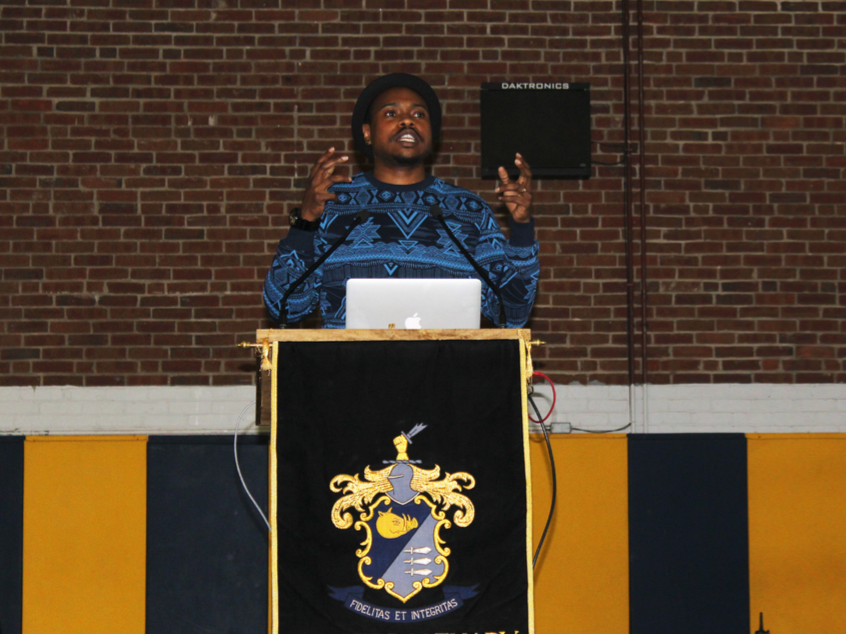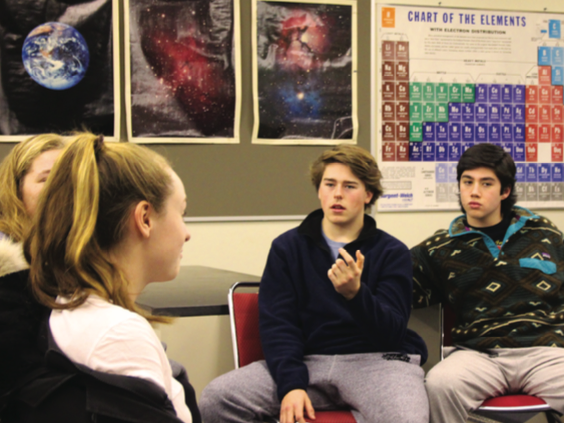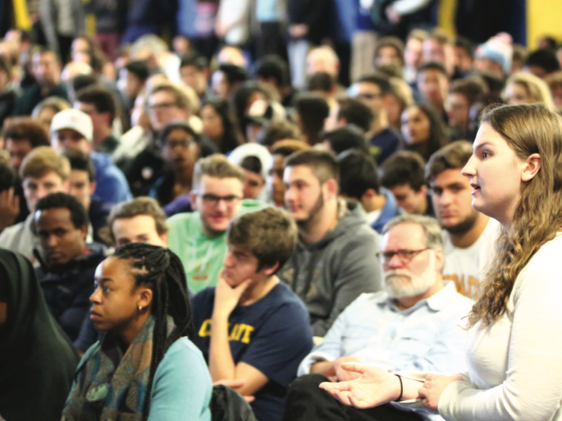
Mr. Tiq Milan, who was assigned female at birth, spoke of inequality and trans rights during his address.
Choate celebrated its fourth annual Diversity Day on January 16, Dr. Martin Luther King Jr. Day, to bring community members together through celebration of differences and similarities.
Larisa Owusu ’17, a member of the Diversity Day Planning Committee and Co-President of Choate Diversity Student Association (CDSA), said, “Diversity Day is a time for the entire school to get together and have difficult and meaningful conversations that many do not or have never had. It is a time to grow as a community and as an individual. It is about listening to people who are not often heard, coming in with an open mind, and learning how to criticize people’s ideas and not their being. Overall, one thing that Choate needs to work on is its ability to communicate. Diversity Day is a great way to begin this kind of open, raw communication if done correctly.”
At the core of the day was the keynote speech delivered by Mr. Tiq Milan, a transgender activist, freelance journalist, and media consultant. Mr. Milan sought to address diversity, empathy, inclusion, and the theme of the day, “you don’t know me until you know me,” by relating these themes to personal experiences and social media comments about diversity related issues.
Mr. Milan commented on creating a space for everyone: “People shouldn’t be forced to be boisterous, forced to have a voice when they haven’t really found that voice in themselves. If someone is scared about what is happening in this world or scared to have an opinion, that’s okay. Go ahead and take a step back and understand better. Everyone’s not going to be an advocate. Everybody’s not going to be a powerful voice. And we shouldn’t expect everyone to be an advocate or powerful voice. We have to make space for everybody. I do this work so other people don’t have to. I’m good at talking about being trans but a lot of people can’t. That’s why I do this.”
While the fundamental goals of this Diversity Day were similar to those of the past, it differed in many ways. Previously, underclassmen and upperclassmen had the same schedule. However, this year, third and fourth formers started the day with workshops at 8:30 a.m. and ended with the 11:30 a.m. keynote address, while the fifth and sixth formers started their day with the speech before moving on to workshops like “Political Correctness” and “Positive Stereotypes” in the afternoon.
Danielle Young ’17, a planning committee member, said, “Our goal when changing the structure was primarily informed by feedback from past facilitators. They really wanted to be involved in the discussions with people in their grade and felt that they couldn’t because they were busy facilitating other forms. This year’s structure helped to accommodate those desires.”
Additionally, in the past, all students participated in activities such as associating identifiers with questions posed by facilitators. However, this year, only third and fourth formers participated in such activities, while upperclassmen partook in discussions and reflections.
Helena Yang ’18, a facilitator, said, “One thing I remember most about facilitating third formers is that they weren’t as exposed to terms that we go over, so discussions were limited. We were the ones educating about these concepts, so we felt the responsibility to do the best we can to introduce the ideas in a way that is unbiased by our personal views. As for fifth and sixth form discussions, I think the adjustments they made, such as focusing on specific topics, fostered a safe environment and productive discussions.”
Last year, each form was separated into large groups of fifty students and four or five facilitators, while this year, underclassmen were divided into groups of around forty students lead by a group of four facilitators and upperclassmen were divided into groups of 11-17 people lead by one facilitator to create a more personal, comfortable atmosphere for students to share their perspectives.

In addition to listening to the Keynote address, students and faculty members participated in workshops.
Many students noticed the differences and the effect they had on the quality of the experience. Spencer Jimenez ’18 commented, “Last year, I felt that the groups were very big and you didn’t have time to be personal. The small groups this year were more personal. Especially at the beginning, when we had the English class, I already knew those people so it was easier to connect with those around me.”
Julia Gottschalk ’20 said, “I had expectations that it would be terrible because that is what I heard from others, but it was better than expected. It was interesting learning about other people’s views on these matters, but I wish that people had more of a chance to tell personal stories of times they encountered diversity.”
Jerri Norman ’17 expressed, “I would love to have more underformers helping with Diversity Day because having a senior voice isn’t always the best, not that we didn’t try our best to be inclusive, but I think it would bring so many fresh ideas and new perspectives to the planning of the next Diversity Day.”
Mr. Kojo Clarke, an adviser to CDSA, added, “If everyone walked into Diversity Day thinking, ‘What can I learn that might help me be more on the same page as the people around me?’ and ‘What can I share that will let other people also be closer to being on the same page with me?’ I think that would help, because we’re both addressing the responsibility to hear other people but we’re also taking advantage of the right that we have to be ourselves as well. My advice is to be open, don’t just lean into discomfort from someone else sharing, also lean into the discomfort of what you yourself want to share but you’re not sure if people are ready for it. Maybe they are, so give them a chance.”



